People have long wondered about this question: which species can ultimately emerge victorious? Many scholars and animal behavior experts have invested countless hours and effort to research this proposal, often engaging in heated debates about the advantages and disadvantages of lions and crocodiles.
Ecology and Characteristics of Lions and Crocodiles
Let’s take a look at the lion. Lions inhabit the African savannah and the Sahel region, often living in groups and forming a structured social hierarchy. With strong limbs and a wild instinct, lions have significantly improved their speed, strength, and intelligence through a long evolutionary process. As apex predators, lions possess strong aggression and unique hunting skills that enable them to capture prey swiftly. Furthermore, their social structure and cooperative skills enhance their effectiveness in hunting.
However, lions also have their drawbacks. Living mainly in open grasslands, the lack of natural shelter makes them vulnerable to prey detection while hunting. Additionally, lions often require long periods of rest and sleep to replenish their energy, leading to a higher demand for food. When prey is scarce, lions can easily starve.
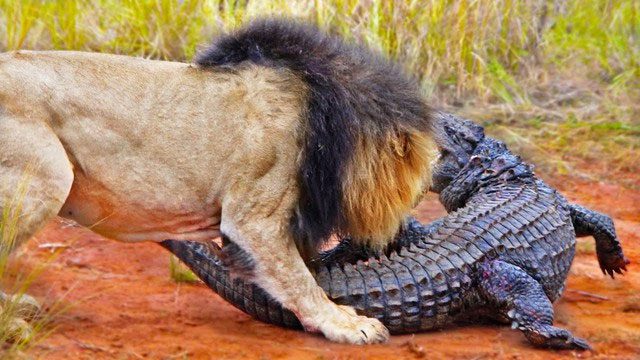
Lions usually live in groups and form a structured social hierarchy.
Next, let’s look at the crocodile. Crocodiles are semi-aquatic animals that inhabit lakes, rivers, and swamps in tropical regions. Their body structure is adapted for life in water, featuring a powerful tail and strong jaws, along with excellent swimming and diving capabilities. The unique body structure of crocodiles makes them outstanding in water, allowing them to swiftly capture prey. Moreover, their skin camouflages well, enabling them to hide underwater, which increases their success rate in hunting.
However, crocodiles also have some disadvantages. Being much slower than many land predators, they are not the best hunters against fast-moving animals. Additionally, because they require an aquatic environment, crocodiles have high adaptability requirements to habitats like rivers and lakes; if the ecological environment is polluted or destroyed, their survival will also be threatened.
Hunting Behavior and Fighting Techniques of Lions and Crocodiles
Let’s examine the attack techniques and fighting strategies of lions. Lions typically work in groups to form a large, organized team. This teamwork allows them to effectively hunt and take down large prey. Lions will leverage their cooperation to encircle prey, using speed and strength to overpower their opponents.
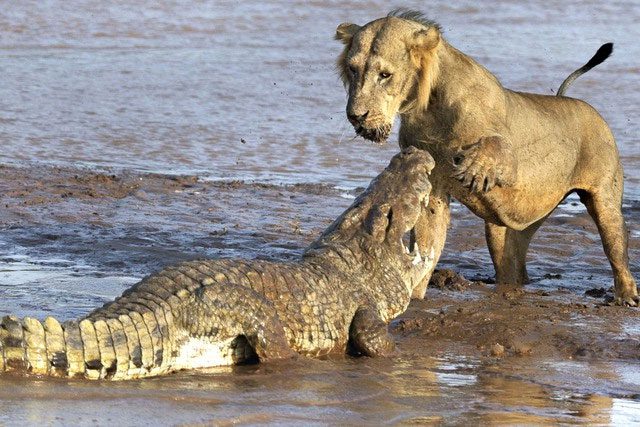
The teamwork of lions allows them to hunt and take down large prey effectively.
Lion attack techniques primarily involve their teeth and claws. Their sharp teeth can easily bite into the throat of prey, causing fatal injuries. Their powerful forelimbs can grab prey, preventing escape. Additionally, lions possess excellent vision and hearing, allowing them to accurately locate and hunt prey.
In contrast, crocodiles are solitary hunters that typically move alone. They prefer to lurk underwater, waiting for prey before swiftly launching themselves out of the water to attack. The attack technique of crocodiles primarily relies on their powerful jaw strength. Their jaws are incredibly strong, and their bite force can easily tear apart prey and inflict fatal wounds. The body structure of crocodiles is highly suitable for underwater hunting, enabling them to swim exceptionally well and move quickly underwater.
Unlike the cooperative approach of lions, crocodiles prefer to lie in wait for prey to take the bait. They will conceal themselves in the water, exposing only their eyes and nostrils, remaining completely still while waiting for prey to come close.
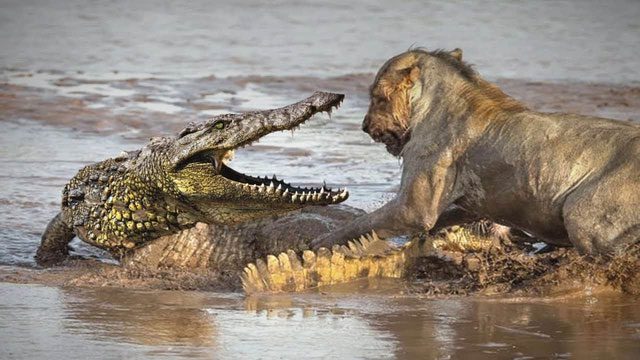
Crocodiles prefer to lie in wait and wait for prey to take the bait.
Although lions and crocodiles have different hunting behaviors and fighting styles, they share a common trait: a high level of adaptability to their living environments. Lions inhabit the African grasslands, while crocodiles live in tropical waters. Their attack techniques and fighting strategies are entirely adapted to the demands of their environments, allowing them to hunt prey more effectively.
The Struggle and Evolution Over Millennia
Lions are the kings of the savannah, renowned for their large size and brave nature. They are excellent hunters and typically hunt in packs. Meanwhile, crocodiles are the kings of the water, relying on their powerful bite and agile swimming abilities to thrive in swamps. These two species inhabit distinct ecological environments and possess unique survival skills, making their competition particularly fierce.
Over the millennia, the competition between lions and crocodiles has focused on their shared territory—the areas along riverbanks. This region features vast grasslands, swift rivers, and bottomless swamps. For lions, this is paradise, while for crocodiles, it is their territory, abundant in food sources.
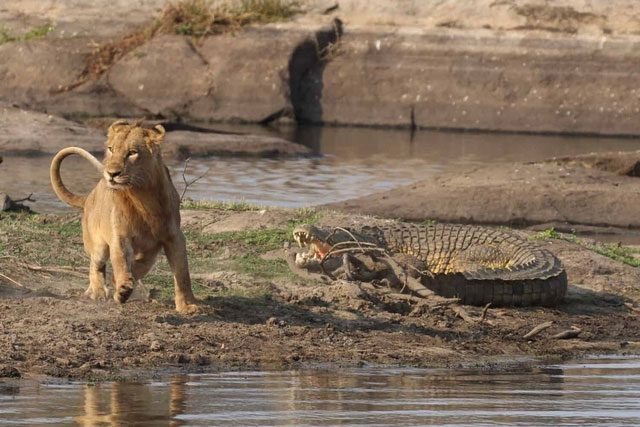
The competition between lions and crocodiles focuses on their shared territory.
In competition, lions often appear in groups to hunt and protect themselves better. They excel in task division and employ encirclement and ambush tactics to defeat their enemies. However, winning in the territory of crocodiles is not an easy feat. Crocodiles must rely on their agile bodies and sharp teeth to fend off lion attacks, only waiting for opportunities to counterattack to maintain their territory.
Over time, lions and crocodiles have gradually developed their unique survival strategies. Through learning, lions have mastered the skills of underwater hunting and successfully taken over portions of crocodile territory. Crocodiles rely on their excellent swimming abilities, especially their capacity to stay submerged to successfully withstand lion attacks.
However, just when it seemed both sides had found their own living spaces, a significant environmental change occurred. Due to global warming and the devastation caused by human activities, rivers are gradually drying up, and water sources are dwindling, which once again escalates the competition between lions and crocodiles.
In this new environment, lions are forced to find new prey and compete with other predators, while crocodiles face a significant reduction in habitat space and food scarcity. Over time, lions gradually establish dominance due to their stronger adaptability and better acclimatization to the new environment, while crocodiles slowly retreat to the desolate river centers.
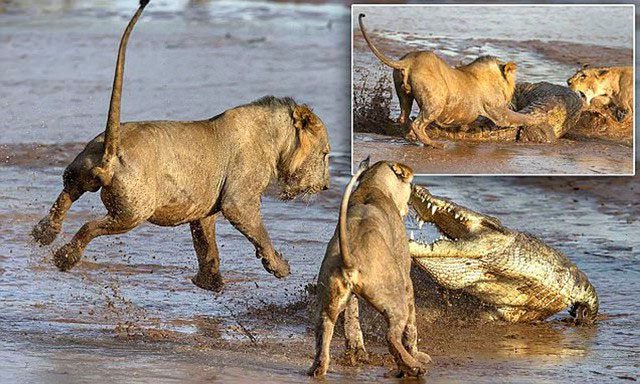
The balance of the ecosystem poses a significant threat to both lion and crocodile species.
Once the balance of the ecosystem is disrupted, the entire environment also changes. A catastrophic chain reaction has led to the extinction of many species, and the collapse of the ecosystem poses a significant threat to both lions and crocodiles.
The Winner Between Lions and Crocodiles
In the fierce confrontations between lions and crocodiles, lions often emerge as the victors. This is not coincidental, as it is due to the physical strength and attack skills of lions. With superior running speed and robust physical condition, lions can quickly track down crocodiles and then bite into the crocodile’s neck, rendering it unable to resist.
Lions possess sharp teeth and strong forelimbs, giving them an advantage in fighting crocodiles. Conversely, while crocodiles have large bodies, tough skin, and powerful bites, they are somewhat slower and less agile, making it difficult to counter lion attacks. Thus, lions often manage to defeat crocodiles.
So what are the reasons behind the outcome of this battle? First, we can start with the habitats of the two species. Lions primarily inhabit the grasslands and dense forests of Africa, while crocodiles are mainly found in rivers and lakes in tropical regions. This means that when lions and crocodiles encounter each other, the battle often takes place on land. Since crocodiles live in water, their mobility is limited, and they are not as agile as lions on land. Therefore, lions can better capitalize on their advantages and launch an effective attack.
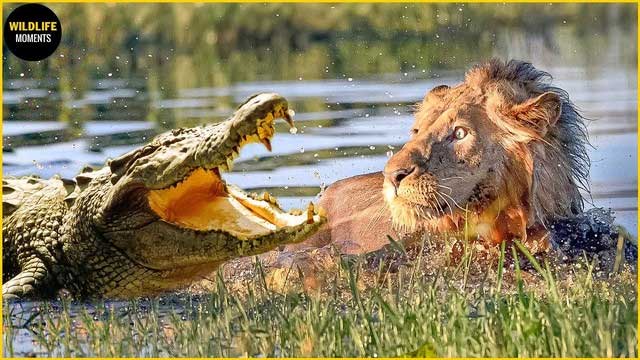
Crocodiles have a disadvantage in their attack methods when fighting lions on land.
The dietary habits of lions and crocodiles are also important factors that influence the battle’s outcome. As carnivores, lions survive by hunting and eating other animals. They possess sharper foraging abilities and are more adept at hunting, allowing them to identify and exploit the weaknesses of crocodiles during confrontations. On the other hand, crocodiles primarily eat other aquatic animals and their attack methods mainly involve waiting, ambushing, and biting to capture prey. While this approach is highly effective in water, it becomes a disadvantage when fighting lions on land.
The survival strategies of lions and crocodiles also impact the battle’s outcome. Lions tend to form social groups and hunt in teams. They can delegate tasks, cooperate, and act together to increase their chances of capturing prey. In contrast, crocodiles prefer to move alone and rely on their strength to hunt. This difference means that the teamwork and organizational discipline of lions give them a higher chance of winning in battles against crocodiles.


















































